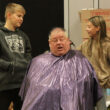Sean C. Morgan
Thanks to a federal grant, Sweet Home residents are next on the county’s list for more primary healthcare options as a new program gets under way at Linn County Health Services.
The Sweet Home Health Center, at 799 Long St., the intersection of Long Street and Oak Terrace, will offer new services, including primary care, in an “integrated” approach to healthcare, with primary, behavioral and oral healthcare. The center will continue to offer services it has in the past.
The program is open to anyone. The facility accepts patients with the Oregon Health Plan or third-part insurance.
For those with no insurance or who are caught in between, making too much money to qualify for OHP and too little to afford good insurance, fees are applied on a sliding scale based on income, with a $20 minimum fee.
This isn’t the first program of this type for the county. A similar program has been in operation in Lebanon for “five or six years,” said Linn County Public Health Administrator Frank Moore.
The Sweet Home program, like Lebanon’s is funded by a grant from the federal Health Resources and Services Administration in a partnership between Linn County Health and Human Services and Community Health Centers of Benton and Linn Counties under an intergovernmental agreement between the two counties.
Initially, the Community Health Centers chose to pursue a grant for the Lebanon office, he said, because Lebanon had critical mass from a financial standpoint.
“Next on the list was Sweet Home,” Moore said. “We went along for quite a while looking for the right opportunity with HRSA.”
Community Health Centers Executive Director Sherlyn Dahl put together the 100-plus-page application, Moore said. “Out of the blue, she gets the award.”
Sweet Home’s grant for this year is $650,000. The new services began Dec. 7, with a primary care physician on site one to two days a week.
The establishment of the new services are a result of changes in the way the state is approaching community healthcare, with a focus on services that work together, Moore and others said.
“This health transformation in Oregon has changed the playing field dramatically,” said former Sweet Home Mayor Tim McQueary, who has been a longtime member of the Community Health Centers board. “This is a tremendous opportunity. It’s something I’ve dreamed of since I got involved eight or nine years ago. Rural communities have always gotten the short end of the stick.
“This is a huge opportunity to show that two counties can work together to achieve something.”
In addition to primary care, new services will include labs, low-cost medications, referrals to specialists and for x-rays, after-hours coverage through a phone triage service, dental service focused on prevention and navigation.
A “navigator” will help people find their way through the healthcare system, helping them find insurance or apply for OHP, Moore said.
“There has been no reduction in services,” Moore said. The Sweet Home office has predominantly provided mental health services and, to a lesser extent, drug and alcohol and public health services. Public health services include limited availability for immunizations, dealing with chronic diseases and communicable diseases, reproductive health and the Women, Infant and Children program.
Over the past decade, the office has been closed every other Friday, Moore said, and it’s only been staffed at about 60 percent of its potential.
“We’ve had a presence here, but we’ve never fully utilized the space,” Moore said.
Now the office will have two full-time primary care providers, including one physician and a nurse practitioner, Dahl said. A physician will begin working in Sweet Home all week on Jan. 4 on a temporary basis while Community Health Centers and Linn County Health search for two full-time permanent providers.
Accessibility is one of the primary reasons for developing the program, Moore said. Residents can access a primary care physician here instead of driving to Lebanon.
It provides more options, he said, and it fulfills a need.
“Early on, I think there was some apprehension on the part of providers that there wasn’t enough demand,” Moore said, but that hasn’t been the experience elsewhere. Officials believe today that Sweet Home is an under-served area.
It also achieves the goals of healthcare transformation in
Oregon, Moore said.
“The difference here is the fully integrated model, with integrated services,” Dahl said.
As a federally qualified health center, it provides comprehensive primary care, including oral, mental and physical health to everyone.
“We did go to Samaritan to support our application, and they did,” Moore said, and Samaritan is working toward the same concept. The Sweet Home Health Center is just a few years ahead of the
“Oregon health transformation.”
Health transformation is a model of providing better health, better care and lower costs to
Oregonians through coordinated-care organizations.
“We really have strong outreach and look for people struggling with access to healthcare,” Dahl said.
Officials are looking at areas like Cascadia and asking how to provide better access, Moore said.
A doctor may have a conversation with a behavior specialist about a patient, who might be depressed or have post-traumatic stress disorder, he said, and the patient can get help on site immediately on the right day in a team-based approach that could even include oral care.
If they’re referred to another provider, half the time, they won’t follow the referral, he noted.
The program is part of the Benton County administrative structure, operating under Benton County budget and personnel policies through an intergovernmental agreement with Linn County. It must be self-sufficient, using the annual grant to support the sliding scale for fees and service, like outreach and navigation.
The program is overseen by a 13-member board, with members from all of the communities with a center, including Corvallis, Monroe, Lebanon, Sweet Home and Alsea, also a new center.
More than 50 percent of the board must also be patients using the program, Dahl said.
Early on, when Community Health Centers first received a grant for federally qualified health centers, Moore said, officials decided they needed local representatives. For Sweet Home that has been McQueary. He served as chairman for several years, and he continues to serve on the board.
The board could have up to 15 members, and the board would like at least one more from the Sweet Home area, especially a patient, Dahl said. “By requiring that the board be the patients, we keep our focus on what the patients need.”
Evening hours are a result, Dahl said.
“We’ve explored and talked about Saturdays also,” McQueary said.
“I think that is one of the things that comes from having consumers guide the organization,” Moore said.
Starting Jan. 4, the clinic will be open from 8:30 a.m. to 5 p.m., with one evening per week for six months.
For more information, call (541) 367-3888.




